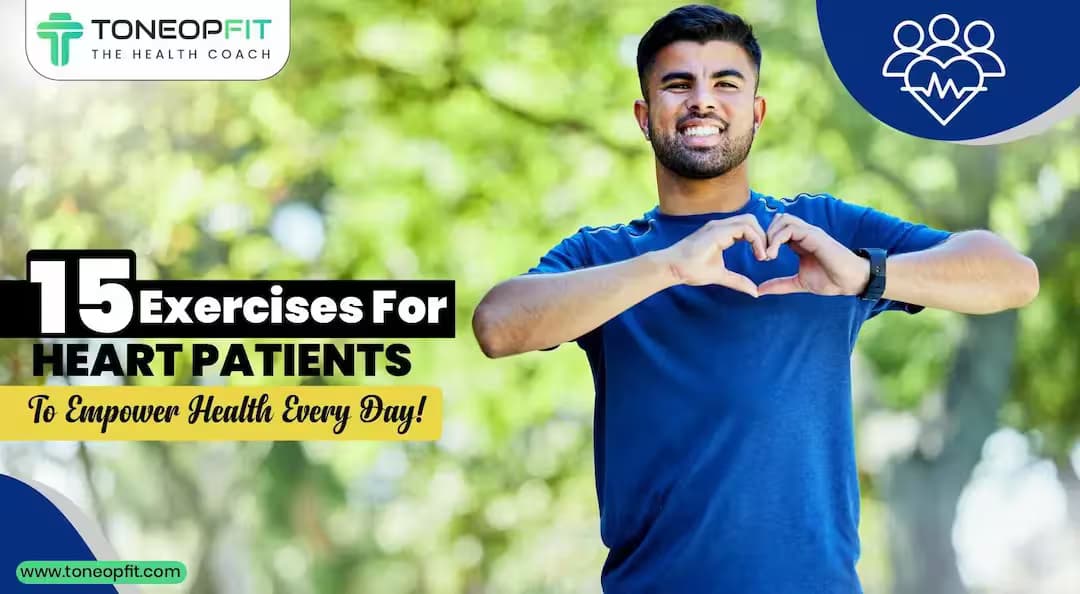The heart is often considered the most important organ of the human body. Naturally, any heart disease is severe and difficult to live with, and people with these diseases typically need physical exercise to manage their symptoms and improve their health.
Some people might think that exerting pressure on a weak heart will further complicate the issues, but regular physical activity can, in fact, improve heart health, enhance circulation, reduce symptoms, and lower the risk of further complications.
Exercise is a structured way to allocate specific time to push the limits of your heart and muscles. For people with heart disease, various types of exercise can be tailored based on the severity of the condition and individual needs. Reducing the risk of heart disease involves more than just walking or stretching; it’s important to ensure that physical activity is evenly distributed throughout the day. Incorporating sustained exercise that challenges the heart is essential for improving overall cardiovascular health.
In this blog, we will give you a comprehensive understanding of appropriate exercise for heart patients! However, it is essential that you consult your doctor before performing any exercise to avoid any unwanted complications. Let’s get into the topic!
Table Of Contents
- Which Is The Best Exercise For Heart Patients? Here Are 15 Expert Recommended Exercises For Cardiac Patients
- Is Too Much Walking Bad For The Heart?
- What Is The Best Walking Speed For Heart Health?
- Expert’s Advice
- The Final Say
- FAQs
- References
Which Is The Best Exercise For Heart Patients? Here Are 15 Expert Recommended Exercises For Cardiac Patients

Taking care of your heart is essential, especially for those with cardiac conditions. Here are 15 easy and effective exercises for heart disease patients:
1. Walking
According to the American Heart Association (AHA), brisk walking at a moderate pace is one of the most effective outdoor activities, is good for heart health and doesn’t exert too much pressure on the heart or the joints.
Mix moderate walking with brisk walking to improve your cardiovascular health without straining your lungs or exhausting yourself. AHA recommends one to “Walk with purpose.”
Take a walk whenever you’re stressed, need air, or want to think about something. Taking your pet or child for a walk, social event, or with friends is good for your physical and mental health. Don’t forget to bring a bottle of water!
Also Read: Step Up Your Health: Learn The Benefits Of Brisk Walking Every Day!
2. Cycling
Cycling (on a bicycle or an exercise bike) can be a low-impact cardio workout that is effective for keeping your heart healthy. Studies show that cycling can help reduce the risk of cardiovascular disease (CVD) in middle-aged men and women. Another study found that cyclists had an 11%-18% lower risk of developing coronary heart disease. So, use your bicycle instead of your car to get around town! This will stimulate your heart and strengthen your calf, thigh, and glute muscles.
3. Sports
Any sport, like badminton, tennis, and basketball, improves blood circulation, enhances oxygen flow and increases heart rate. All of this helps improve heart health. However, if you have heart problems, avoid the excessive strain that comes with different forms of sports and consult your doctor before exercising or joining a group.
4. Swimming
Swimming is a full-body aerobic exercise which is an excellent option for heart patients and offers numerous benefits. It is low-impact and easy on the joints. It helps improve cardiovascular fitness, enhances circulation, and improves strength, endurance, and stamina.
However, it may not be suitable for everyone. If you have a heart condition, check with your doctor to see if you can swim.
Also Read: 10 Amazing Benefits Of Water Walking And Exercise Routines For Better Health
5. Strength Training
Strength training can be beneficial for heart patients, but it should be done with caution. When done right, it can improve muscle strength, boost metabolism, and enhance overall cardiovascular health. Strength training for 30 minutes, even two days a week, can be very beneficial. However, individuals with heart conditions must consult their healthcare provider before starting any strength training program.
Remember these key points:
- Start slow with light weights and focus on proper form.
- Monitor intensity and keep it moderate so you don’t overexert yourself.
- Allow rest and adequate recovery time.
- Focus on functionality and choose exercises that enhance daily activity and mobility.
6. Resistance Band Exercise
Resistance band exercises can be an excellent way for heart patients to incorporate strength training into their exercise routine! Resistance bands come in various thicknesses, and thicker bands provide more resistance than thinner bands.
Exercises you can do with resistance bands are:
- Bicep Curls
- Chest Press
- Seated Row
- Squats
- Lateral Raises
- Tricep Extension
- Hip Thrust
- Overhead Press
- Glute Bridge
7. Bodyweight Exercises
If you don’t like lifting weights, you can still do strength training using your body weight. Instead of using dumbbells or plates, you lift your own body weight. This can include moderate to high-intensity exercises such as pushups, mountain climbing, high jumping, and squats. Your trainer will design a safe and effective bodyweight training program based on your fitness level and heart condition.
Also Read: Implement These 20 Bodyweight Training Exercises For A Good Workout!
8. Stretching
Doing stretching exercises after a workout helps cool down your muscles (walk or run to warm them up before exercise). You can also do exercises like toe touches, calf, neck, and arm stretches. Stretch for 10-15 minutes every day to allow better blood flow and to open and relax the muscles.
9. Yoga
Yoga asanas and pranayama are great for improving heart health. They relieve stress while improving muscle tone and lung capacity. Scientists claim that yoga is beneficial to any lifestyle for managing cardiovascular disease. Rehabilitation trainers believe that yoga adds value to rehabilitation treatment for people with cardiovascular diseases.
Join ToneOp’s Live Yoga Sessions for holistic well-being, mastering asanas, pranayama, and meditation with real-time interaction and guidance from experienced instructors.
10. Arm Circle
Arm circles are a weightless exercise that focuses on the shoulders and forearms. They are popular as a warm-up for strength training or other sports. People usually do them until they feel a burning sensation. However, you can also count each 10-second move as one set and each circuit as one repetition. This exercise can also help improve heart rate and circulation in older adults.
11. Jumping Rope
A jump rope workout is a dynamic cardio workout that involves jumping rope over and over again. It burns calories efficiently while improving cardiovascular health, coordination, and agility. Incorporating jumping rope into your routine can improve your heart health and overall fitness.
12. Tai Chi
A form of exercise based on Chinese martial arts, Tai Chi is a popular at-home workout for people with heart disease. Heart patients perform slow, rhythmic body movements with focus and deep breathing. This program can be a relaxing exercise for both the body and mind.
13. Pilates
Pilates is a low-impact exercise that focuses on strengthening muscles while improving posture and flexibility. It emphasises core strength, stability, and controlled movements, making it ideal for heart patients looking to improve overall fitness and mobility.
Also Read: 15 Easy & Effective Pilates Exercises at Home To Get Complete Full-Body Fitness
14. Dancing
Grab those shoes for cha-cha-cha! Dancing is an excellent exercise option for heart patients, offering both physical and emotional benefits. Research indicates that moderate-intensity dancing can significantly lower the risk of cardiovascular disease, with one study showing a 46% reduction in mortality from heart-related issues among those who dance regularly.
This activity improves cardiovascular fitness and enhances mood through social interaction and stress relief. Styles like Zumba, ballroom, and even folk dancing provide enjoyable ways to engage in aerobic exercise, making it easier to stick with a routine.
15. Climbing Stairs
Climbing stairs can be a highly beneficial exercise for heart patients. Recent research indicates that regularly ascending stairs is linked to improved cardiovascular health and a reduced risk of heart disease.
In fact, people who climb more than five flights of stairs daily may lower their risk of cardiovascular events by up to 20% compared to those who do not climb stairs at all. This activity combines aerobic and strength training, making it an effective way to improve heart health.
Also Read: World Heart Day 2024: Theme, Motto And Engaging Activities To Promote Heart Health
Is Too Much Walking Bad For The Heart?
Heart patients often wonder if walking too much poses any danger to their heart. The answer is a simple NO! In fact, walking is one of the most popular types of exercise for cardiovascular endurance.
Walking is an easy way to maintain or improve cardiovascular health. It is also a free form of exercise. It does not require any special skills or equipment. It is one of the safest ways to be active and has many additional mental and physical benefits. It’s natural and just as important for survival today as it was 100 years ago.
Start with regular walking and gradually progress to brisk, sustained walking as you gain strength and endurance. It’s a good idea to use a smartwatch to monitor your heart rate while walking to see how your body responds. Stop walking and take a break when you feel like your body and heart are under pressure.
The cardiovascular benefits of regular walking include:
- Reduces cholesterol levels
- Lowers blood pressure
- Reduces risk of premature death
- Improves arterial health
- Prevents weight gain
Additional benefits of walking:
- Increase energy and mood
- Help you think more clearly
- Improves sleep
- Prevents other diseases such as diabetes, dementia, some cancers, and infectious diseases
- Reduces inflammation throughout the body
- Reduces stress
- Strengthens bones
All of these health issues are closely linked. Obese people are more likely to have high blood pressure, and people with high blood pressure are more likely to have diabetes, sleep apnea, and depression. And they are at a higher risk of cancer and premature death. Walking improves all of these problems, ultimately leading to better health.
Also Read: Every Step Counts: Delve Into 5 Proven Benefits Of Walking Every Day!
What Is The Best Walking Speed For Heart Health?
The theory of walking speed and heart health reflects a simple truth in cardiology: your overall fitness and muscle strength can help predict your risk of developing heart disease.
The ability to walk faster is a sign of physical fitness and healthy muscle mass. It’s a measure of muscle strength, just like any other physical activity. That makes walking speed a useful indicator of heart health and overall health. If you have good cardiorespiratory fitness and a high activity level, you tend to have better heart health.
Most adults should walk faster than 4.8 km/h (12 minutes per kilometre) to reduce their risk of heart disease. But it can be hard to tell how fast you’re walking unless you're on a treadmill. One way to determine your pace is to use a fitness tracker or app, like ToneOp, that measures your speed and distance. Additionally, you can time yourself over a known distance, such as a mile or kilometre, and calculate your speed from there.
Another way to determine if your physical activity is good enough is to take the speech test. A moderate-intensity walk should allow you to carry on a conversation comfortably without going out of breath. If you aim for an intense activity level, you should be able to say a few words at a time without stopping to catch your breath. Your intensity level may be too high if you are too out of breath to speak.
Expert’s Advice
Regular exercise is essential for heart patients' cardiovascular health. Activities like walking, cycling, and swimming with a focus on moderate intensity are recommended and encouraged. Aim for at least five days of exercise per week, including light strength training and flexibility exercises.
Always start with a warm-up and end with a cool-down. Listen to your body and stop if you feel any discomfort. Staying hydrated and following a heart-healthy diet are also important.
Health Expert
Lavina Chauhan
The Final Say
Exercise is highly recommended for heart health - especially for those who follow a sedentary lifestyle and unhealthy diet. From lowering blood pressure and promoting weight loss to reducing inflammation and cholesterol levels, the benefits of the exercises mentioned in the blog are excellent and heart-healthy.
However, high-intensity interval training, marathons and triathlons may be unsuitable for people with heart disease. More importantly, consult your doctor before starting these exercises and remember to warm up for at least 10 minutes.
FAQs
1. Can a weak heart be reversed?
Yes. Certain exercises and treatments can help grow new muscle cells and blood vessels, allowing your heart to work more efficiently.
2. Is running good for your heart?
Yes. Running reduces the risk of stroke and heart attack by lowering BMI, cholesterol and blood pressure.
3. What are the best weightless exercises for heart disease patients?
Here are some good weightless exercises for heart disease patients:
- Walking
- Jogging
- Swimming
- Cycling
- Body-weight squats
- Push-ups
- Lunges
4. How do you plan structured workouts for heart patients?
Start with a warm-up to prepare the body, followed by 30 minutes of moderate aerobic exercise like walking or cycling. Include strength training twice a week, focusing on body-weight exercises. Always cool down and stretch after workouts.
References
- https://pharmeasy.in/conditions/heart-diseases/exercises-for-heart-patients-in-india/
- https://www.stylecraze.com/articles/best-exercises-heart-health/?sem_campaign=PMAXDynFitness_India&gad_source=1&gclid=Cj0KCQjwgrO4BhC2ARIsAKQ7zUnRZpYkLx2Yadh2r1BKT3lPCatpkI3Dw_Zp-7GvHmMrWNzkqRZ4NWkaAsNIEALw_wcB#11-best-exercises-for-a-healthy-heart
- https://www.massgeneralbrigham.org/en/about/newsroom/articles/benefits-of-walking-for-heart-health
- https://www.uhhospitals.org/blog/articles/2024/04/can-intense-exercise-put-your-heart-at-risk#:~:text=Getting%20regular%20exercise%20is%20one,because%20of%20existing%20heart%20disease.
- https://www.nationaljewish.org/education/health-information/living-with-heart-disease/exercise-and-heart-disease
- https://www.godigit.com/health-insurance/exercise/exercise-for-heart-patients
- https://www.verywellhealth.com/walking-speed-healthy-heart-7564562
- https://www.medanta.org/patient-education-blog/how-much-should-you-walk-to-reduce-your-risk-of-heart-disease
About ToneOp Fit
ToneOp Fit is a platform dedicated to improving and maintaining good health through a comprehensive range of goal-oriented health plans with up to 3 Coach support. With a range of Weight Management, Medical Condition, Detox Plans, and Face Yoga Plans, the app also provides premium health trackers, recipes and health content. Get customised diet, fitness, naturopathy & yoga plans and transform yourself with ToneOp.










































